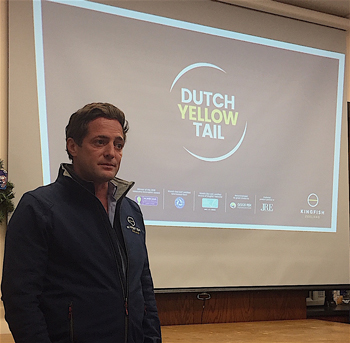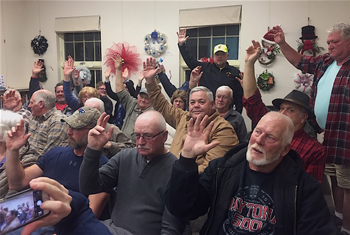$100M Land-located Fish Farm Coming to Jonesport
by Nancy Beal

Ohad Maiman, the CEO of Kingfish Zeeland. Using slides he described what his company would do if the community accepted the company’s plan. Nancy Beal photo.
The town of Jonesport has had an economic development committee for several years, but it has never organized around a project that would bring business into the primarily fishing community. Last month, however, a million-dollar opportunity dropped into town without invitation but looking for a welcome and a chance to become a “local” business.
That entity is Kingfish Zeeland, a Dutch company that built a land-based fish farm in the Netherlands in 2017 and began marketing Dutch yellowtail to the European market the following year. It also reached American consumers by way of a Florida marketing firm and expensive airfreight. In search of a U.S. site that would eliminate those costs and the middlemen, its personnel explored the U.S. eastern seaboard and identified 22 potentially suitable sites, two of which were in Maine. Last week, it announced that Jonesport had edged out the other in nearby Gouldsboro.
Ohad Maiman, the youthful, smiling and deferential CEO of Kingfish Zeeland, stood before a crowd of about 50 in the community room of Jonesport’s Peabody Memorial Library November 20 and, using slides, described what his company would do “if you’ll accept us here.” The plant would cover 15 to 20 acres of the 95-acre plot, known at “Dungarvin,” north and east of Greenwood Cemetery and the U.S. coast guard housing complex. Along with over $100,000,000 in investment, he said it would offer approximately 70 jobs, most of which would be filled by locals trained by the company.
Initial production would be approximately 6,000 metric tons of yellowtail in various sizes, harvested according to customers’ needs, said Maiman. Yellowtail which, prior to Kingfish Zeeland’s farm in the Netherlands, was only wild harvested in Japan, can be prepared baked, broiled, cold smoked, flame roasted, and marinated and served whole as a centerpiece or in pieces for other dishes, he explained. He called it a high-end food, a strong fish that nonetheless needs “pampering.” He said raising yellowtail in what he called a “high-tech greenhouse for fish” combined the latest technology with old-fashioned farming. One asset that attracted the company to Jonesport, he said, was the hard work ethic of its fishermen.
Questions from the audience
Many of the questions that followed Maiman’s presentation came from those fishermen who were concerned about the effect of Kingfish Zeeland’s operation on the waters from which they earn their living and on which the company would depend for the lifeblood of their operation. Seawater is filtered both coming and going from the ocean, Maiman explained. Solids in the outflow are captured and diverted to a holding pond, where they settle or are dried and sold to fertilizer producers. (The company has not yet lined up a buyer.) In the Netherlands, he said, fishermen harvest the sea around the outfall and the water is so clean that some even bottle and sell it for cooking their product.
Seawater is too cold for yellowtail, Maiman said (even if any escaped into the ocean, they would die of exposure rather than contaminate ocean species), so it must be warmed up for the fish farm. That heat is recaptured as the water flows back to sea and reused. “If we mess up our water source,” he said, “we shoot ourselves in the leg.” His company emphasizes sustainability, he said, and his customers expect it. Kingfish Zeeland has been awarded two coveted industry certifications that indicate it has succeeded.

About 50 area residents met in the community room of Jonesport’s Peabody Memorial Library November 20, 2019. Attendee’s asked questions about fresh water use, effluent, tax breaks and traffic. The Dutch company built a yellowtail facility in the Netherlands, but seeks proximity to the U.S. market. Nancy Beal photo.
Jonesport lobsterman Rocky Alley, who is also president of the Maine Lobstering Union, wanted to know the volume of the discharge. The answer was 100 cubic yards (roughly 378,000 gallons) per hour. Alley wanted to know the size of the pipes and whether the company would dredge and bury them. Those details, said Maiman, as well as how far into Chandler Bay the pipes would extend, would be worked out if the locals approved of the project.
The audience of Moosabeckers was peppered with a few faces from out of town who had learned about the meeting from previously published reports. Holly Faubel of Machiasport asked if any freshwater would be used. The answer: no. Would there be processing on site, she asked? Just packing and shipping at first, said Maiman. If processing were introduced later, Maiman mused that the discarded racks and guts might be made available for lobster bait.
Then Faubel asked about effluent, calling it “always an issue” in processing that used seawater, especially with respect to algae blooms in deep water. Could the company calculate the nitrogen discharge? she asked, encouraging the company to aim for “zero discharge.” It would depend on state regulations, responded Maiman, who added that he and his colleagues had already talked with regulators and had been told their plans looked permissible. If Jonesporters approved their proposal, he said he planned to apply for the necessary permits “right away.”
(In late December, Kingfish’ local agent said that the application process was underway. Earlier in the month, a press release from the company revealed that it had secured financing in Europe.)
Other questions addressed the impact on the surrounding community. The only near neighbors, said Maiman, are residents of the coast guard housing complex. He likened the plant to a “farm in the woods” that, except in the construction stage, would not produce annoying noise. Traffic, he said, would be “minimal,” perhaps two to four trucks per day which would be routed via Route 187 North to Jonesboro rather than through Jonesport’s downtown.
Traffic would be
“minimal,” perhaps two
to four trucks per day.
Others wanted to know if Kingfish Zeeland would pay the taxes imposed by the town of Jonesport, or if they planned to take advantage of tax relief programs available to businesses that hired a certain number of employees. Maiman said he was unaware of such programs. Megan Sorby who, with her husband Tom, are the Maine representatives for the company, said, “We are farmers and there are tax incentives for farmers.” She added that she had already been in discussions with the Maine Department of Economic and Community Development and the local high school [where aquaculture courses have already been suggested].
Repeatedly, and no doubt aware of opposition to proposed land-based fish farms in Belfast and Bucksport, Maiman deferred to the public, hinting that Kingfish Zeeland would not force itself on the Moosabec area if the local citizens didn’t want it there. Dungarvin falls within the area where commercial fishing activity is allowed, so there would be no zoning issues that would block its permitting. If approved, Maiman said that construction could start in early 2021 and last a year or a year-and-a-half, after which the plant would become operational.
When a straw vote on the proposal was called at the end of the November 20 meeting, all hands went up, including that of Ernest Kelley, Jr. who lobster fishes in the area where the discharge would be released. “If I lose a little bit of fishing area,” he said following the meeting, “if it brings 80 jobs to Jonesport, it’s worth it.”
Seawater is filtered both coming and going from the ocean. –Ohad Maiman, Kingfish Zeeland
We are farmers and there are tax incentives for farmers. –Megan Sorby, Maine reptesentartives for the company.
